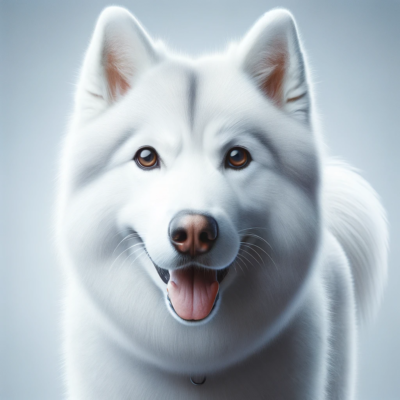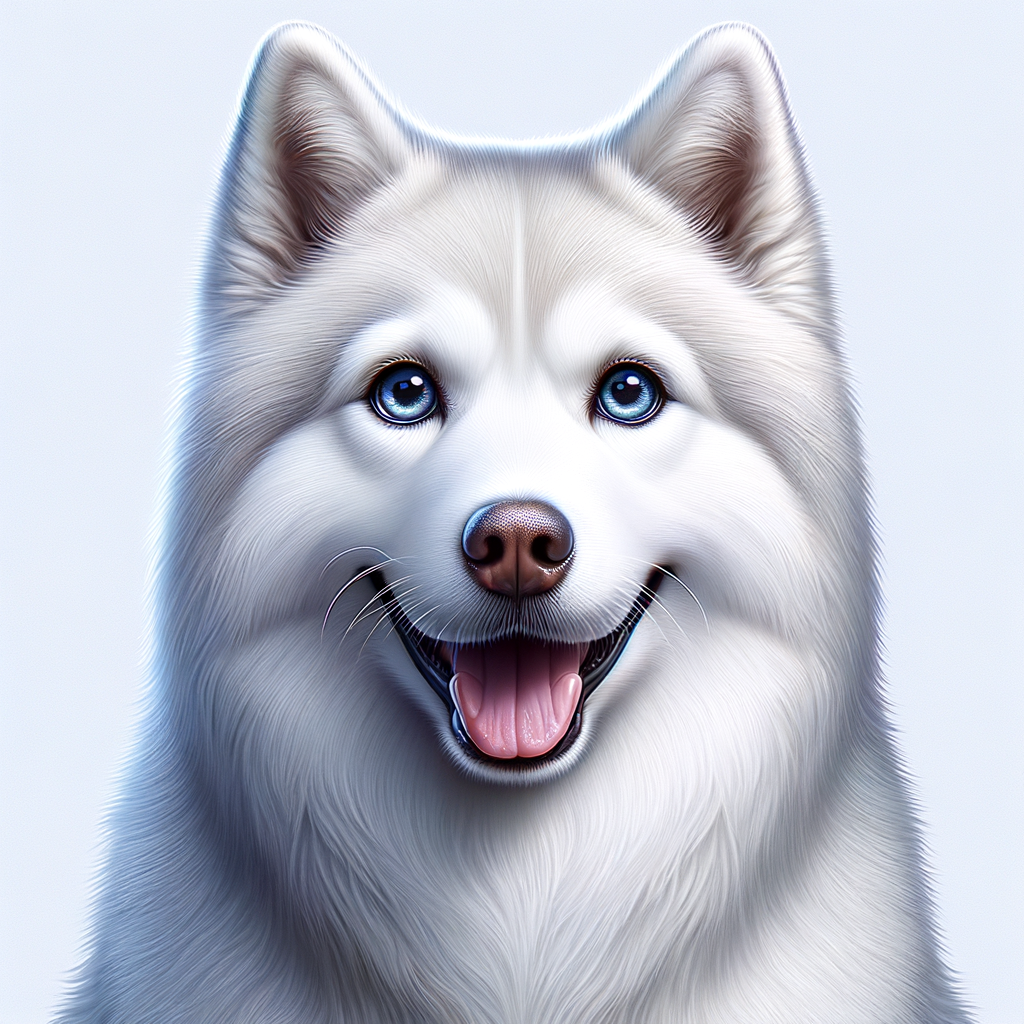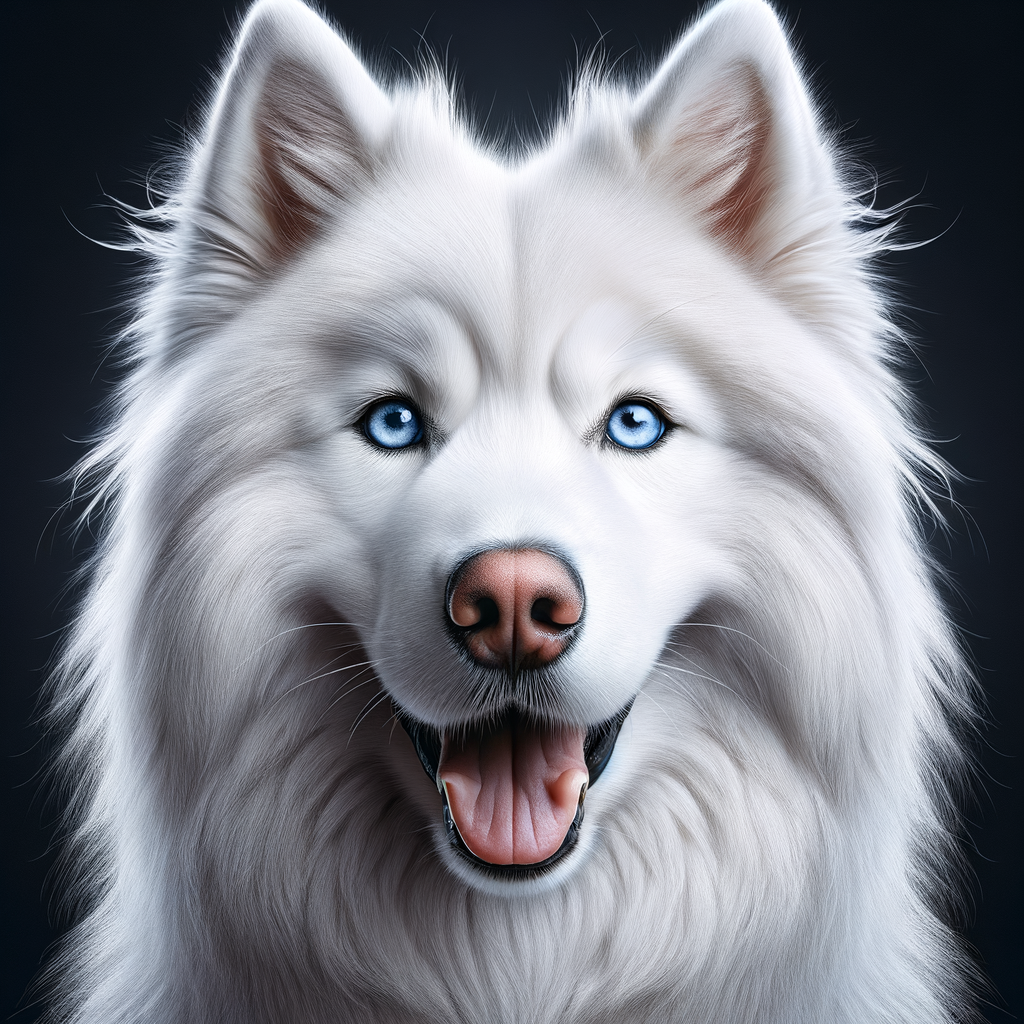Hello there, I’m Dr. Candy, a holistic veterinarian with a special interest in canine breeds. Today, let’s explore the wonderful world of White Huskies. These snowy Siberian breeds are known for their striking appearance and vibrant energy. In this comprehensive guide, we’ll delve into everything from their temperament to their health, grooming, and nutrition needs. Let’s get started!

General Temperament Of the White Husky
Ready to dive into the world-packed with adventure, love, and a little bit of mischief? Let’s embark on a journey to understand the heart of a white husky! More than just a stunning exterior, this breed has a temperament that’s as unique and captivating as their icy-blue or warm-brown eyes.
Is White Husky Family & Kid Friendly?
Absolutely! White huskies are known for their friendly and gentle nature. They are incredibly sociable dogs that thrive in family environments. They form strong bonds with their human companions and are very affectionate. And when it comes to kids, a white husky is not just a pet, it’s a playmate! Their playful and energetic demeanor makes them an instant hit with children.
- Patience and Tolerance: White huskies are patient and tolerant, which make them great companions for children. However, as with all breeds, early socialization is key. Introduce your white husky to children and other pets at an early age.
- Protectors: They are also known to be protective, which can be a huge advantage in a household with children. Your white husky will always be on guard!
Despite their friendly nature, it’s important to teach your children how to interact with dogs to ensure safety on both ends. As much as white huskies love to play and have fun, they also need their space and quiet time.
Energy Level Of White Husky
Ever seen a snowstorm in action? That’s what the energy level of a white husky can feel like! Historically bred to pull sleds in the freezing conditions of Siberia, these dogs have energy to spare.
- Exercise Requirements: White huskies require a lot of exercise, and I mean a lot! Two hours of physical activity per day is a good starting point. This can include walks, runs, playtime, and mentally stimulating games.
- Restlessness: If they don’t get enough exercise, they can become restless and resort to destructive behaviors. So, if you’re a couch potato, a white husky might not be the best match for you.
Despite their high energy levels, white huskies are known to be quite relaxed indoors. They are perfectly content to chill out and be a couch potato with you after they’ve had their daily exercise.
So there you have it, the general temperament of a white husky. They are friendly, energetic, and family-oriented dogs that can bring a lot of joy and fun into your lives. But remember, they also require a lot of care, exercise, and love. So, are you ready to embark on this exciting journey with a white husky?

Average Lifespan of a White Husky
A White Husky is known for its vigorous health and long lifespan. On average, a healthy White Husky can live between 12 to 15 years. This lifespan is considerably high compared to other large breed dogs. However, several factors can influence the lifespan of your fluffy friend, including diet and the timing of spaying or neutering.
How Diet Affects Lifespan
Just like in humans, diet plays a crucial role in a dog’s health and longevity. A well-balanced diet rich in proteins, healthy fats, vitamins, and minerals can significantly increase the lifespan of your White Husky.
Feeding your White Husky a diet specifically designed for large breeds can help prevent obesity, a common problem that can lead to various health issues such as diabetes, heart disease, and arthritis. Also, consider incorporating fresh fruits and vegetables into your Husky’s diet for additional vitamins and nutrients.
It’s important to note that while treats can be a useful tool for training, they should be offered in moderation. Excessive treats can lead to weight gain and other health problems. Always remember that a healthy diet equals a healthy, happy, and long-living White Husky.
How Spay & Neuter Timing Affects Lifespan
The decision to spay or neuter your White Husky is a personal one, but it’s important to consider the timing. Recent studies have indicated that early spaying and neutering can have adverse effects on a dog’s health.
Early spaying or neutering can cause joint and bone deformities, disrupt hormones and development, and increase the risk of cancer. These issues can lead to serious chronic diseases like thyroid problems and Cushing’s disease.
Therefore, it’s advisable to consult with your vet about the best time to spay or neuter your White Husky. This decision should be based on your dog’s age, overall health, and lifestyle.
In conclusion, the average lifespan of a White Husky is significantly influenced by diet and the timing of spaying or neutering. By providing your Husky with a balanced diet and scheduling spaying or neutering at an appropriate time, you can help ensure your furry friend lives a long, healthy life. The key is to always consult with your vet and make informed decisions about your White Husky’s health care.
Should You Rescue or Purchase a White Husky?
When deciding to bring a white husky into your life, you may be torn between rescuing or purchasing. Both options have their unique benefits and should be considered carefully.
Benefits of Rescuing or Adopting
Choosing to rescue or adopt a white husky can be an incredibly fulfilling experience. Here are some reasons why:
- Save a Life: By adopting a white husky from a shelter or rescue, you’re giving a second chance to a dog that may have been abandoned, lost, or surrendered. This act of kindness can be incredibly rewarding.
- Cost: Adoption fees are typically much lower than purchasing from a breeder. This cost often includes initial veterinary care such as spay/neuter surgery, vaccinations, and microchipping.
- Support Shelters: Your adoption fee goes directly back into the shelter, helping them care for more animals in need.
- Adult Dogs: Many dogs in shelters are adults, meaning they may already be house-trained and have basic obedience skills. This can make the transition into your home smoother.
Benefits of Buying
On the other hand, buying a white husky from a reputable breeder also has its advantages:
- Health Testing: Reputable breeders often perform genetic testing to ensure they’re breeding the healthiest dogs possible. This can reduce the risk of your husky developing certain inheritable diseases.
- Predictability: When you purchase a puppy from a breeder, you’ll likely have a better idea of the dog’s adult size, temperament, and health, as you can meet the parents and see the environment the puppy was raised in.
- Breeder Support: A good breeder will be there to answer questions and provide support throughout your dog’s life. This can be especially helpful for first-time husky owners.
Whether you choose to rescue or purchase, it’s essential to remember that owning a white husky is a long-term commitment. These dogs are known for their high energy levels and need for mental stimulation, so ensure you’re ready for the responsibility before bringing one into your home.

Average Cost For A White Husky
When considering adding a white husky to your family, it’s essential to understand the costs involved. The average cost of a white husky puppy typically ranges from $600 to $1,300. However, this can vary depending on various factors such as the breeder’s reputation, the puppy’s lineage, and the location.
Average Cost
White huskies are a specific and sought-after color variant of the Siberian Husky breed. Therefore, they can be more expensive than other husky colors. Here’s a breakdown of the average costs you might expect:
- Purchase price: As mentioned earlier, this can range from $600 to $1,300 for a puppy. Adult dogs may be slightly cheaper, but this depends on their health and training status.
- Veterinary costs: Initial veterinary costs, including vaccinations, deworming, and spay/neuter, can add another $100 to $300 to your initial expenses.
- Supplies: Essential items like a crate, leash, collar, food, and toys can add up to around $200 to $400.
Remember, these are just initial costs. Owning a dog comes with ongoing expenses, such as food, grooming, regular vet check-ups, and potential health issues that may arise.
What To Look For In A Breeder
When purchasing a white husky, it’s crucial to choose a reputable breeder. Here are some things to consider:
- Health testing: A good breeder should have health tests done on the parent dogs to ensure they are free from genetic diseases that could be passed on to the puppies.
- Living conditions: The puppies should be raised in a clean, comfortable environment. Avoid breeders who keep their dogs in cramped, dirty conditions.
- Knowledge: A reputable breeder should have a deep understanding of the breed and be able to answer any questions you have about the breed’s characteristics, health, and care requirements.
- References: Ask for references from previous buyers. This will give you an idea of the breeder’s reputation and the quality of their dogs.
In conclusion, while white huskies can be a bit pricey, their loyal nature, stunning appearance, and playful energy make them a wonderful addition to any family. Just make sure to budget accordingly and choose a reputable breeder to ensure you’re getting a healthy, happy puppy.
Training & Behavior of White Huskies
When it comes to the trainability of a white husky, it’s worth noting that they are both intelligent and independent, which can be a blessing and a curse. Their intelligence means they pick up on commands and tricks quickly, but their independent streak can sometimes lead to stubbornness. This is why consistent, positive reinforcement training methods work best with this breed.
Overall Trainability
Training a white husky can present a unique set of challenges if you’re not prepared. They require a firm, consistent hand and lots of patience. They’re quick learners, but their stubbornness can often be a barrier to training. Therefore, it’s crucial to start training your white husky from a young age to set a solid foundation for good behavior.
Remember, white huskies, like other dog breeds, respond best to positive reinforcement techniques. This could include treats, verbal praise, or toys to reward them for good behavior. Punishing them for bad behavior is likely only to make them more obstinate and less likely to obey your commands.
Crate Training: Recommended and Why
Crate training is highly recommended for white huskies, especially for puppies. A crate provides a safe space for your dog and can be a crucial tool in house training. It can help establish routines and give your husky a sense of security.
But how do you crate train your white husky? Start by introducing them to the crate gradually. Make it a positive experience by putting their favorite toys or a comfortable blanket inside. You can also feed them their meals in the crate to create a positive association. Eventually, they’ll start to see the crate as a safe and comfortable place to be.
Potential Negative Behaviors to Watch For
White huskies are generally well-behaved dogs, but, like any breed, they can develop certain negative behaviors if not properly trained. Here are a few potential issues to look out for:
- Escape behavior: White huskies are known for their ability to escape. They can easily jump over fences or dig under them. If you have a white husky, ensure your yard is secure and consider investing in a high fence.
- Destructive behavior: White huskies, especially when bored or not getting enough exercise, can become destructive. They might chew on furniture or dig in the yard. Regular exercise and mental stimulation can help mitigate this behavior.
- Vocalization: Huskies are known for their vocalization. They howl, whine, and make other noises more than most other breeds. While this isn’t necessarily a negative behavior, it’s something to be aware of.
It’s important to remember that with proper training and socialization, most of these behaviors can be managed. Understanding your white husky’s needs and providing them with a structured, loving environment can help ensure they grow up to be well-behaved and happy dogs.

Grooming Requirements For White Husky
When it comes to grooming, the beautiful white husky requires a bit more attention than some other breeds. This is primarily due to its thick double coat that keeps it warm in the coldest of climates. Here’s what you need to know about grooming your white husky.
What About Shedding
The white husky is known for its significant shedding. Twice a year, during the spring and fall, they go through a process called “blowing coat.” This is when the husky sheds its entire undercoat, resulting in a large amount of loose fur. It’s a natural process that helps the dog adjust to changing seasons.
During these periods, daily brushing is recommended to help manage the shedding. Use a deshedding tool or a rake brush designed for dogs with thick coats. This will help remove loose fur and prevent it from accumulating all over your home. Outside of these shedding seasons, brushing a few times a week should suffice.
Excessive Shedding May Be Due To Nutrition
If you notice your white husky is shedding excessively or more than usual, it may be a sign of poor nutrition. Huskies need a balanced diet to maintain a healthy coat. A lack of essential nutrients can lead to dull fur and excessive shedding.
Some signs of poor nutrition include dull, dry, or brittle fur, skin issues, and increased shedding. If your husky is showing these signs, it might be time to reassess their diet. You might want to consider a dog food that is specifically formulated for huskies or dogs with thick coats. These foods often contain higher levels of omega-3 and omega-6 fatty acids, which can help improve the health and appearance of your dog’s coat.
Keep in mind that sudden or extreme changes in your dog’s coat or shedding patterns can also signal a health problem. If you’re concerned, it’s always a good idea to consult with your vet.
We’ll delve deeper into the nutrition and health of white huskies in the upcoming section. Proper nutrition not only impacts your dog’s health but also their coat’s condition, shedding levels, and overall appearance.
Grooming your white husky is not just about making them look good. It’s also an important part of their overall health and wellbeing. Regular grooming sessions can help you keep track of any changes in your dog’s coat and skin, and can also be a great bonding experience for both of you.
Overall Health of the White Husky
When it comes to the overall health of a white husky, they are known for being a relatively healthy breed. Their sturdy and robust physique is a testament to their good health. However, like any other breed, they are not completely invincible to health issues.
It’s crucial to remember that the health of your white husky largely depends on the care you provide. Regular vet check-ups, a balanced diet, and a proper exercise regimen are all crucial elements to maintain the health of your beloved pet.
Potential Health Conditions
While white huskies are generally healthy, they can be susceptible to certain health conditions. Here are some potential health issues you should be aware of:
- Hip and Elbow Dysplasia: This is a common condition in larger breeds, including the white husky. It’s a degenerative disease where the hip or elbow joint doesn’t develop correctly, leading to arthritis or potential lameness. Regular exercise and maintaining a healthy weight can help manage this condition.
- Eye Conditions: White huskies are prone to several eye problems, including cataracts, corneal dystrophy, and progressive retinal atrophy. Regular eye check-ups can help detect these conditions early and provide appropriate treatment.
- Hypothyroidism: This condition occurs when the thyroid gland doesn’t produce enough hormones, leading to weight gain, lethargy, and skin problems. A healthy diet and regular vet check-ups can help manage this condition.
Keeping Your White Husky Healthy
As a dog parent, you play a vital role in your white husky’s health. Regular exercise is crucial for this energetic breed. They love to run and play, so make sure you provide them with enough physical activities.
A balanced diet is another important factor. Feed them high-quality dog food suitable for their age, size, and activity level. And remember to keep them hydrated, especially during hot summer days.
Regular vet check-ups are necessary to detect any potential health issues early. Keep up-to-date with their vaccinations, and don’t forget about regular worming and flea treatments.
Final Thoughts
Being a dog parent to a white husky is a wonderful and rewarding experience. Their friendly nature, striking appearance, and playful energy can bring so much joy and happiness to your home. However, it also comes with the responsibility of ensuring they live a healthy and happy life. By keeping a keen eye on their health, feeding them a balanced diet, and providing regular exercise, you can ensure your white husky lives a long, healthy, and fulfilling life. Remember, a healthy dog is a happy dog.
Nutrition & Diet for White Husky
Feeding your white husky the right diet is crucial for their overall health and well-being. Dr. Candy, a renowned canine nutritionist, provides some insightful nutrition tips for this beautiful breed.
Nutrition Tips from Dr. Candy
Dr. Candy emphasizes that white huskies, just like other Siberian huskies, require a balanced diet that includes proteins, fats, carbohydrates, vitamins, and minerals. It’s important to understand that these dogs have a high energy level and hence require a diet that fuels their activities. She recommends:
- Protein-rich diet: As carnivores, huskies need a diet high in animal proteins for muscle development and energy. Sources can include chicken, beef, fish, and lamb.
- Healthy fats: Essential for skin and coat health and also provide energy. Look for foods with Omega-3 and Omega-6 fatty acids.
- Carbohydrates: While huskies do not require a lot of carbs, they do need some for energy. Opt for complex carbs like sweet potatoes and brown rice.
- Vitamins and minerals: Needed for overall health and immune system support. Can be found in fruits, vegetables, and some commercial dog foods.
Best Foods for White Husky
Feeding your white husky a balanced diet can help maintain their health and prolong their lifespan. Here are some of the best foods that Dr. Candy recommends for a white husky:
| Brand | Key Ingredients |
|---|---|
| Blue Buffalo Wilderness High Protein | Deboned Chicken, Chicken Meal, Peas, Pea Protein, Tapioca Starch |
| Nutro Ultra Adult Dry Dog Food | Chicken, Chicken Meal, Whole Brown Rice, Brewers Rice, Rice Bran |
| Wellness CORE Grain-Free Original Deboned Turkey | Deboned Turkey, Turkey Meal, Chicken Meal, Peas, Potatoes |
Remember, every dog is unique and may have different dietary needs. It’s always best to consult with your vet before making any significant changes to your husky’s diet.
Conclusion
Just like the snowy landscapes they’re named for, white huskies are a unique, beautiful breed with their own distinct needs and characteristics. Their bright, energetic personalities require a diet that can keep up with them, rich in proteins, fats, and the right balance of nutrients. With the right nutrition and care, your white husky can live a long, healthy, and happy life. So, whether you’re a new white husky parent or an experienced owner, remember to keep your dog’s dietary needs in mind as you navigate this wonderful journey of pet ownership.
Frequently Asked Questions
What is the average lifespan of a White Husky?
White Huskies, like other Siberian Huskies, typically live between 12 to 15 years. This can be influenced by factors such as diet, exercise, and overall health care.
Are White Huskies a separate breed from other Siberian Huskies?
No, White Huskies are not a separate breed. They are Siberian Huskies that happen to have a white coat. The white coat is just one of many colors that this breed can have.
Do White Huskies require a lot of exercise?
Yes, White Huskies are very active and energetic dogs that require a lot of exercise. They are happiest when they have plenty of space to run and play, and they also enjoy activities like hiking and sledding.
Are White Huskies good with children?
Yes, White Huskies are known for being friendly and gentle with children. They are also very social dogs that get along well with other animals, making them a great choice for families.
Do White Huskies shed a lot?
Yes, White Huskies do shed a lot. They have a double coat that sheds heavily twice a year. Regular brushing can help manage the shedding and keep their coat healthy.
Dr. Candy, a holistic veterinarian and certified raw dog food nutrition specialist, graduated from Oklahoma State University in 2009 with a DVM and has since specialized in companion animal nutrition, advocating for species-specific diets. With a background in wildlife rehabilitation and oil spill response, she combines holistic health and conventional medicine in her unique approach to treating chronic diseases, allergies, and autoimmune conditions in pets. As the owner of a veterinary practice in Colorado and an author, Dr. Candy is dedicated to educating pet parents and improving the health and happiness of animals.




